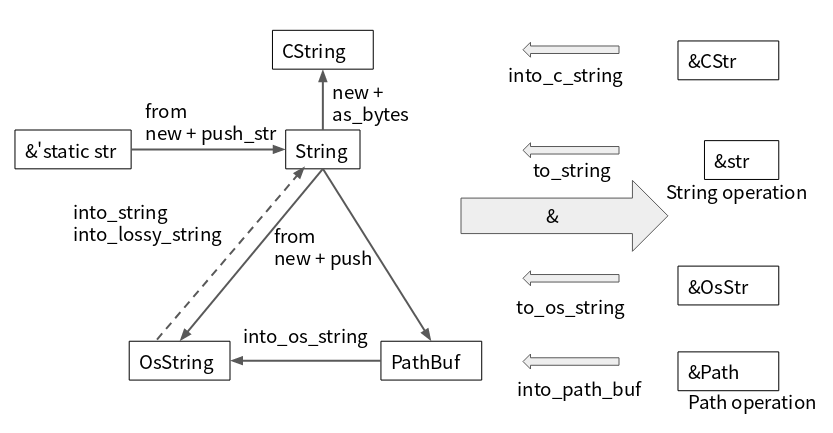故事是這樣子的,最近把小弟自幹的編譯器加上 rust 的 llvm wrapper llvm-sys,經過一陣猛烈的攪動之後,自幹的編譯器終於可以 dump LLVM IR 了,雖然只會輸出一個空殼子…但有第一步總是好的。
不過小弟在綁定的時候遇到一個大問題,也就是 Rust 裡面的 String,到底怎麼會有這麼多種,因為寫的時候一直沒搞清楚,然後就會被編譯器噴上一臉的錯誤,覺得痛苦,於是決定來打篇整理文。
簡單來說,Rust 的 std 有四種 String,每個 String 都有動態記憶體模式跟沒有 size 資訊(不是 Sized)的靜態模式,他們是:
| dynamic type | static type |
|---|---|
| std::string::String | std::str |
| std::ffi:OsString | std::ffi::OsStr |
| std::path::PathBuf | std::path::Path |
| std::ffi::CString | std::ffi::CStr |
還有一個比較少用,只能表示 ascii 128 字元組成的字串的 std::ascii::asciiExt,在 1.26.0 已經 deprecated 了,這裡就不介紹了。
一般的程式語言在數字型態通常都很固定,Rust 就很明確的分為 i8, i16, i32, i64 …,就偏偏字串是個大坑, 因為從 ASCII 到 unicode,字串實在有太多分岐,儘管有 unicode 也不是到處適用。 Rust 從設計上一開始就直接採用 utf-8 作為設計標準,原生的 String/str 就是 utf 8 字串。
可是呢,並不是所有作業系統都玩 utf8 這套,因此 Rust 有另一個使用 wtf8 的 OsString, wtf8 跟 utf8 的差異在於 wtf8 算是<格式比較差>的 utf8,會出現一些 utf8 不允許的位元組,偏偏規格沒有要求一定要完美格式, 造成 windows 或 javascript 有時會出現這種格式不良的 wtf8 字串,因此 OsString ,跟專門用來表示路徑的 PathBuf 就是使用 wtf8。
有關 wtf8 請參考:https://simonsapin.github.io/wtf-8/
上面的字串都是在型態中記錄字串長度,結尾不會有 \0 字元,CString 則是最傳統的 null-terminated 字串,在呼叫 C 函式的時候,一定要用 CString 傳遞才行。
順帶一提,一般寫在 code 裡面的 let hello = "hello world" 的型態是 &'static str:生命週期為 static 的靜態字串。
知道了以上幾個區別之後,就來看看要怎麼使用它們:
String
String 最簡單,裡面一定要是 utf8,產生就是從 static str 產生,或者是 new 之後慢慢 push 進去:
let hello : String = String::from("hello");
let mut world : String = String::new();
world.push_str("world");
world.push('!');
OsString
OsString 是類似的,但只能從 String 轉過來(注意 String 的所有權會轉給 OsString),或者一樣 new 之後 push String 進去:
use std::ffi::{OsString, OsStr};
let oshello : OsString = OsString::from(hello);
let mut world : OsString = OsString::new();
world.push("world!");
PathBuf
PathBuf 其實就想成 OsString 就好,兩者也可以互相用 from 轉換:
use std::path::{PathBuf, Path};
let p1 : PathBuf = PathBuf::from(oshello)
let mut p2 = PathBuf::new();
p2.push("/dev");
上面說了,OsString 跟 PathBuf 用的是 wtf8,是 utf8 的超集,因此一般只能單向從 String 到 OsString,反向是不行的,
呼叫 OsString::into_string() 得到的是 Result<String, OsString>,也就是有可能會轉失敗;
或者就是用 into_lossy_string 把編碼不完整的地方變成 U+FFFD,utf8 的 replacement character。
PathBuf 則是沒有 into_string 可以用,只能先轉換成 OsString 再轉過去,我也不知道為什麼 core team 要這樣設計。
剩下的就是函式了,很有趣的是 String, OsString, PathBuf 都是動態容器,操作內容都要轉換到 str, OsStr, Path 上面去:
- str 有操作字串用的
split_whitespace,starts_with等等 - OsStr 沒有任何特殊的函式XD。
- Path 有很多對路徑的操作:
is_absolute,parent,with_extension等等
很多函式操作後都會得到 Path 或是 OsStr 讓你做接下來的操作。
CString
CString 比較棘手一點,它要在 new 的時候代入 Vec<u8> (或者有實作 Into<Vec<u8>> 的型態)
來建立 CString,new 會自動在後面加上 \0 ,因此這個 Vec 裡面不應該有 \0。
其實我覺得把 CString 想得 Vec<u8> 的另一種型態就好了,它本身也提供 into_bytes, as_bytes 等函式轉換成 Vec<u8> 的型態。
如果要從 String 跟 OsString 轉換過來的話,String 要用 as_bytes() 轉成 Vec<u8>,
OsString 因為 unix 跟 windows 會有不同的 OsString 實作,不一定都能轉成 Vec<u8>,
在 unix 要引入 std::os::unix::ffi::OsStrExt 就可以將 OsString 用 as_bytes() 轉成 Vec<u8>;Windows 則建議轉成 String 再轉成 bytes ,請參考這個網址
。
用上了 CString,最重要的就是要交給外部的 C 函式去用,要用 as_ptr() 取出字串部分的 pointer,得到的就是 * u8 了,有必要的話再加上 as *const i8 轉型一下。
例如我要呼叫這個函式:
LLVMPrintModuleToFile
LLVMPrintModuleToFile(LLVMModuleRef M, const char *Filename, char **ErrorMessage)
我的檔案名稱是一個 OsString:
use std::ffi::{CString, CStr};
use std::os::unix::ffi::OsStrExt;
llvm::core::LLVMPrintModuleToFile(
self.module,
path.as_bytes().as_ptr() as *const i8,
ptr::null_mut()
);
看了這麼多,簡單整理一下大概是這樣:

老實說每次只要在 Rust 裡面弄到 Path 都會弄到懷疑人生……